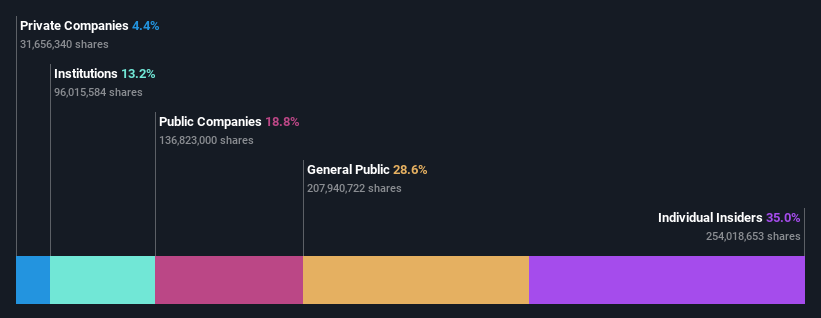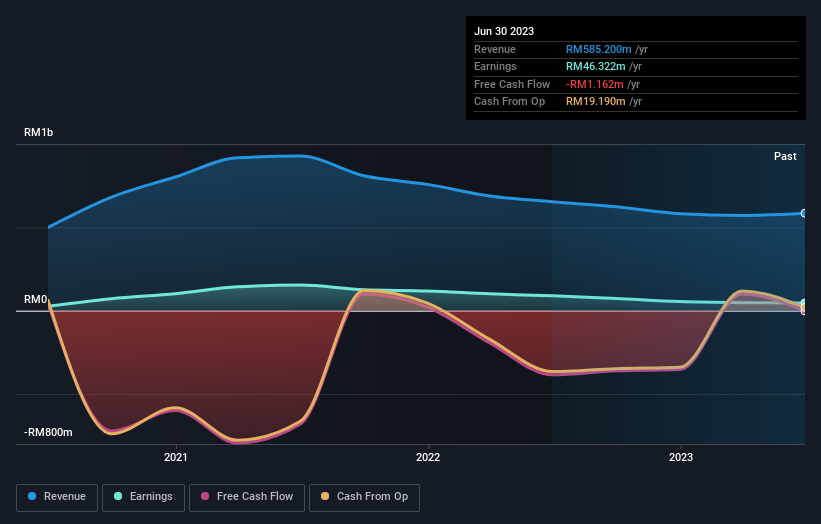Kenanga Investment Bank Berhad (KLSE:KENANGA) insiders have significant skin in the game with 35% ownership
Key Insights
Insiders appear to have a vested interest in Kenanga Investment Bank Berhad's growth, as seen by their sizeable ownership
The top 7 shareholders own 53% of the company
Institutional ownership in Kenanga Investment Bank Berhad is 13%
If you want to know who really controls Kenanga Investment Bank Berhad (KLSE:KENANGA), then you'll have to look at the makeup of its share registry. And the group that holds the biggest piece of the pie are individual insiders with 35% ownership. That is, the group stands to benefit the most if the stock rises (or lose the most if there is a downturn).
With such a notable stake in the company, insiders would be highly incentivised to make value accretive decisions.
Let's take a closer look to see what the different types of shareholders can tell us about Kenanga Investment Bank Berhad.
See our latest analysis for Kenanga Investment Bank Berhad
What Does The Institutional Ownership Tell Us About Kenanga Investment Bank Berhad?
Institutional investors commonly compare their own returns to the returns of a commonly followed index. So they generally do consider buying larger companies that are included in the relevant benchmark index.
We can see that Kenanga Investment Bank Berhad does have institutional investors; and they hold a good portion of the company's stock. This implies the analysts working for those institutions have looked at the stock and they like it. But just like anyone else, they could be wrong. If multiple institutions change their view on a stock at the same time, you could see the share price drop fast. It's therefore worth looking at Kenanga Investment Bank Berhad's earnings history below. Of course, the future is what really matters.
We note that hedge funds don't have a meaningful investment in Kenanga Investment Bank Berhad. Cahya Mata Sarawak Berhad is currently the company's largest shareholder with 19% of shares outstanding. For context, the second largest shareholder holds about 14% of the shares outstanding, followed by an ownership of 4.8% by the third-largest shareholder. Paduka Tengku Noor Binti Tengku Ismail, who is the second-largest shareholder, also happens to hold the title of Top Key Executive. Furthermore, CEO Chay Leong is the owner of 0.8% of the company's shares.
We did some more digging and found that 7 of the top shareholders account for roughly 53% of the register, implying that along with larger shareholders, there are a few smaller shareholders, thereby balancing out each others interests somewhat.
While it makes sense to study institutional ownership data for a company, it also makes sense to study analyst sentiments to know which way the wind is blowing. Our information suggests that there isn't any analyst coverage of the stock, so it is probably little known.
Insider Ownership Of Kenanga Investment Bank Berhad
The definition of an insider can differ slightly between different countries, but members of the board of directors always count. Company management run the business, but the CEO will answer to the board, even if he or she is a member of it.
Most consider insider ownership a positive because it can indicate the board is well aligned with other shareholders. However, on some occasions too much power is concentrated within this group.
Our most recent data indicates that insiders own a reasonable proportion of Kenanga Investment Bank Berhad. It has a market capitalization of just RM628m, and insiders have RM220m worth of shares in their own names. It is great to see insiders so invested in the business. It might be worth checking if those insiders have been buying recently.
General Public Ownership
The general public, who are usually individual investors, hold a 29% stake in Kenanga Investment Bank Berhad. While this group can't necessarily call the shots, it can certainly have a real influence on how the company is run.
Private Company Ownership
It seems that Private Companies own 4.4%, of the Kenanga Investment Bank Berhad stock. Private companies may be related parties. Sometimes insiders have an interest in a public company through a holding in a private company, rather than in their own capacity as an individual. While it's hard to draw any broad stroke conclusions, it is worth noting as an area for further research.
Public Company Ownership
Public companies currently own 19% of Kenanga Investment Bank Berhad stock. This may be a strategic interest and the two companies may have related business interests. It could be that they have de-merged. This holding is probably worth investigating further.
Next Steps:
I find it very interesting to look at who exactly owns a company. But to truly gain insight, we need to consider other information, too. Consider for instance, the ever-present spectre of investment risk. We've identified 2 warning signs with Kenanga Investment Bank Berhad (at least 1 which is concerning) , and understanding them should be part of your investment process.
If you would prefer check out another company -- one with potentially superior financials -- then do not miss this free list of interesting companies, backed by strong financial data.
NB: Figures in this article are calculated using data from the last twelve months, which refer to the 12-month period ending on the last date of the month the financial statement is dated. This may not be consistent with full year annual report figures.
Have feedback on this article? Concerned about the content? Get in touch with us directly. Alternatively, email editorial-team (at) simplywallst.com.
This article by Simply Wall St is general in nature. We provide commentary based on historical data and analyst forecasts only using an unbiased methodology and our articles are not intended to be financial advice. It does not constitute a recommendation to buy or sell any stock, and does not take account of your objectives, or your financial situation. We aim to bring you long-term focused analysis driven by fundamental data. Note that our analysis may not factor in the latest price-sensitive company announcements or qualitative material. Simply Wall St has no position in any stocks mentioned.

 Yahoo Finance
Yahoo Finance 

